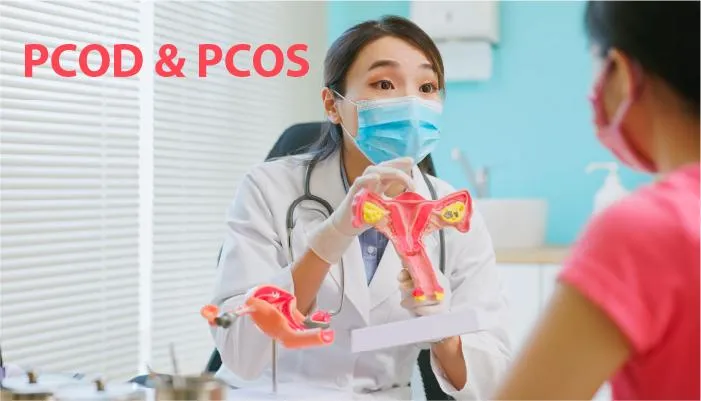The Difference Between PCOD and PCOS
February 24, 2023
PCOD and PCOS are terms generally used interchangeably. However, these conditions are different from each other, even though both cause hormonal disturbances in women. PCOD stands for Polycystic Ovarian Disorder, while PCOS stands for Polycystic Ovarian Syndrome. PCOD and PCOS are hormonal disorders in females due to the formation of cysts in the ovaries. PCOD results from an imbalance of hormones, while PCOS is a metabolic disorder.
What is PCOD?
PCOD or Polycystic Ovarian Disorder is a result of hormonal imbalance in women. This results in the release of immature eggs turning into cysts during ovulation. As a result, ovaries release a large amount of androgen, a male sex hormone, leading to an irregular menstrual cycle and exhibiting symptoms like male pattern hair loss and weight gain.
What is PCOS?
PCOS stands for Polycystic Ovarian Syndrome. This metabolic disorder is more severe than PCOD. Due to PCOS, the ovaries release many male sex hormones, like androgen. The excess of androgen in the female body results in the formation of follicular cysts in the ovaries. Cysts can lead to anovulation or no release of eggs or ovum during ovulation. Symptoms of PCOS include obesity, infertility, and loss of hair.
Causes of PCOD & PCOS
PCOD
- Imbalance of female and male sex hormones
- Insulin resistance
- Inflammation
- Unhealthy lifestyle
- Stress
PCOS
- Genetic disorder
- Type II diabetes
- Excess of androgen
- Obesity
Occurrence of PCOD & PCOS
PCOD: Usually, PCOD is very common in women throughout the world. Nearly 10% of women worldwide suffer from PCOD.
PCOS: It is a severe medical condition affecting 0.2% to 2.5% of women globally.
Symptoms of PCOD & PCOS
Usually, the symptoms of PCOD and PCOS include heavy bleeding, pelvic pain, irregular menstrual cycle, weight gain, or acne. Some symptoms to differentiate between them are as follows:
PCOD
- Male pattern baldness
- Excess facial hair
- Severe acne
PCOS
- Irregular menstrual cycle
- Skin tags on neck
- Darkened skin
- Mood swings
When to see a doctor?
You must visit a gynaecologist if your periods are irregular and you are experiencing infertility. If you are suffering from unusual hair growth and male pattern baldness, the doctor will perform tests to detect PCOD or PCOS.
Possible complications in PCOD & PCOS
PCOD: It is commonly found in women but doesn't lead to complications. Women suffering from PCOD have irregular menstrual cycles due to cysts in the ovary, but it doesn't affect fertility because women can still ovulate. Thus, it doesn't hinder pregnancy.
PCOS: It is a serious condition in women that affects fertility and thus pregnancy. The primary reason is anovulation as a result of PCOS. There is a high risk of ectopic pregnancy, miscarriage, or the birth of a premature child. Other complications associated with PCOS are heart diseases, high cholesterol levels, or type II diabetes.
Treatment of PCOD & PCOS
Usually, the treatment methods for PCOD and PCOS are similar, including:
- Combined birth control pills - These pills are a mixture of progesterone and oestrogen that regulate the hormonal level by decreasing androgen. This reduces the formation of more cysts and acne.
- Progestin therapy - This therapy doesn't reduce androgen levels or avoid pregnancy. Progestin is consumed for 10-14 days to regulate the menstrual cycle. It also protects women from endometrial cancer.
- Hormonal birth control - These pills reduce unwanted hair and acne and regulate the menstrual cycle.
- Immature follicle treatment - This treatment reduces the number of immature follicles in the ovaries to facilitate pregnancy.
- Laparoscopic ovarian drilling - It triggers the release of mature ovum from the ovaries every month (ovulation) by reducing the level of testosterone hormones in females.
- Regular exercise
Conclusion
PCOD and PCOS can be treated if you contact a gynaecologist or infertility specialist based on your symptoms. After noticing the symptoms, get a diagnosis as quickly as possible. Treatment of these diseases will ensure that you have a healthy reproductive life. In most women, PCOD and PCOS can be cured by home remedies and following a healthy lifestyle.
If you have any queries about PCOS or PCOD, contact a doctor to get professional medical advice.
Request an appointment at Apollo Spectra Hospitals Call 1860 500 2244 to book an appointment
There are several at-home remedies to prevent PCOD and PCOS by changing diet and lifestyle, like reducing consumption of carbohydrates and fats to regulate blood glucose and cholesterol levels and maintaining a healthy weight. You must consume unprocessed food, leafy vegetables, nuts, and whole grains.
There are many ways to diagnose PCOS like: Pelvic examination - It helps to physically examine the pelvic region to identify cysts or abnormal growth in or around reproductive organs. Imaging tests - Ultrasound, MRI, and CT scan can examine the lining of the uterus and the presence of ovarian cysts. Blood tests - They are helpful in examining the levels of hormones in the body.
Yes, you can get pregnant even after suffering from PCOD because ovulation will still occur. You must consult the gynaecologist regularly.
NOTICE BOARD
CONTACT US
CONTACT US
 Book Appointment
Book Appointment


.svg)
.svg)
.svg)
.svg)








